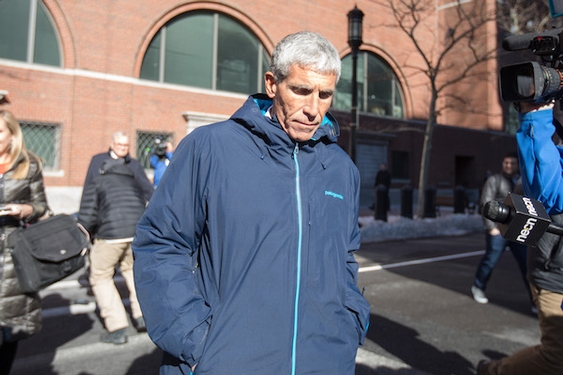A Stanford review found the mastermind behind the national college admissions scandal had approached seven coaches with promises of generous payments for recommending athletically unaccomplished applicants for admission to the elite university as sports recruits, the university said Tuesday.
Only one, the former sailing coach who pleaded guilty earlier this year, went along with the scheme, Stanford said. It was unclear whether other coaches approached about the scheme tried to raise red flags about it with administrators, but Stanford announced several new policies to bolster admission oversight.
William “Rick” Singer, the Newport Beach college consultant who pleaded guilty to racketeering conspiracy and other charges in March, is awaiting sentencing in the nationwide scheme of selling test cheating and fraudulent athletic recruitment to elite universities including Stanford, the University of Southern California and Georgetown.
Among those caught up in the scheme along with Hollywood actresses, Silicon Valley moguls and wealthy executives on both coasts was former Stanford head sailing coach John Vandemoer. He pleaded guilty in March and was sentenced to a day served in prison, six months’ home confinement and probation for accepting bribes through Singer totaling $770,000 to recommend students for admission as his athletic recruits even though they weren’t competitive sailors.
Stanford said it hired an international law firm to investigate, which interviewed more than 55 people and obtained and reviewed more than 35,000 records.
It found “Singer directly or indirectly approached seven Stanford coaches about potential recruits between 2009 and 2019,” but “no evidence that any employee of Stanford Athletics other than the former head sailing coach agreed to support a Singer client in exchange for a financial consideration.”
While the review found “no evidence of any other fraudulent schemes for the admission of student-athletes during this period,” it also noted “there was no systematic way for concerns about Singer to be elevated and addressed, to ensure increased attention by others he attempted to contact.”
The scandal prompted universities to tighten admission oversight. The University of California system launched two audits, and one of them completed in June found “no widespread problems or weaknesses.” But it prompted UC to strengthen oversight including monitoring student-athletes’ participation in athletic programs. The second UC audit, which will include a closer look at application verification controls and student-athlete participation, is expected to be completed early next year.
Vandemoer was among the first besides Singer to plead guilty in the scheme, in which test proctors, coaches and dozens of wealthy parents also have been charged. Stanford fired him that day.
He steered a total of $770,000 from Singer to Stanford’s sailing program, for which he agreed to recommend enrollment for the student applicant children of Singer’s clients as his athletic recruits even though they had little or no boating experience.
Singer gave Vandemoer a $500,000 check for the sailing program on behalf of a Chinese family who wanted to get their daughter into Stanford. The student’s 2016 application came too late for Vandemoer to recommend her enrollment, prosecutors said, but she was admitted anyway based in part on an application Singer prepared that included fraudulent sailing credentials. The student has since been expelled, and it has since been reported that her family had paid Singer $6.5 million to secure her admission.
In the spring of 2018, Singer delivered Vandemoer a check for $110,000 to recommend a second student for admission through his sailing program, but that student decided to attend Brown University in Rhode Island instead, prosecutors said.
Later in the year, Vandemoer at Singer’s request designated a third applicant as a sailing recruit, falsely representing she had “solid experience at Newport Beach Yacht club and training at the US sailing center in Long Beach,” where she commuted from Las Vegas to compete.
The student ultimately chose to attend Nashville’s Vanderbilt University instead of Stanford. Prosecutors said Singer, who by then was cooperating with them, later gave Vandemoer another check for $160,000 to keep their relationship “alive” and to hold a recruitment spot open for another of his clients. In a recorded phone call, Vandemoer said he understood that the student he would recommend wouldn’t be a competitive sailor.
U.S. District Court Judge Rya Zobel in June gave Vandemoer one of the more lenient sentences of those who have pleaded guilty in the case, noting that the former coach had promptly acknowledged his guilt and had not personally taken the bribe money but instead put it into the school’s sailing program.
Stanford said Tuesday that its review concluded the university’s “rigorous approach to admissions,” with the admissions office rather than coaches making the final decision, “appears to have made it harder for Singer to manipulate the process.”
But the investigation included several recommendations the university said it would enact, including adoption of a formal written policy codifying Stanford’s approach to donations and athletic recruits making clear that “admission of any applicant, student-athlete or not, cannot be bought, and no donor should ever be under the impression that it can.”
Other recommendations include a requirement that university fundraising officials independently verify the source and purpose of significant donations to the athletic department, and that coaches flag any case in which a recruit came to their attention through a third-party recruiter or consultant.
The university also announced that on advisement of the state attorney general’s office, Stanford will donate the $770,000 received through Singer to organizations “supporting financially challenged high school students who are seeking financial support and enhanced preparation toward their college admission.”
“Taken together, these steps provide for clearer policies, more training, fuller communication and stronger vetting that will serve as a bulwark against fraudulent efforts in the future,” Stanford President Marc Tessier-Lavigne said Tuesday in a statement to the university community.
———
©2019 The Mercury News (San Jose, Calif.)
Visit The Mercury News (San Jose, Calif.) at www.mercurynews.com
Distributed by Tribune Content Agency, LLC.












